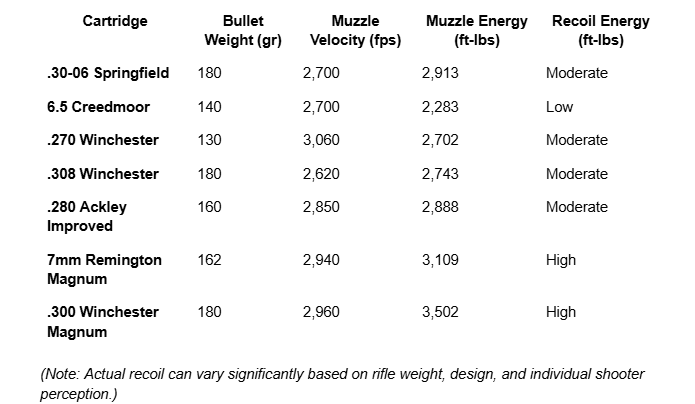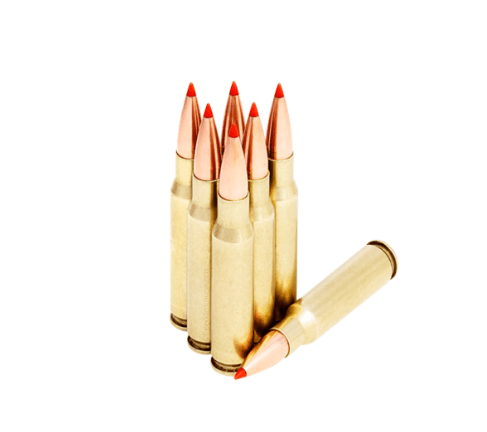Is the .30-06 Still the King of Big Game Hunting?


Justin Hunold
05/09/2025
As I snuck down the side of a ridge in the famed Adirondack Mountains, I heard some crunching coming from the pine swamp below, the unmistakable sound of a deer. I saw him coming into the hardwood valley just below the ridge. With a few days to hunt and Adirondack bucks notoriously hard to come by, there was no question this 6-pointer was in trouble. I knelt down, centered my crosshairs on his chest, and took up the slack on the trigger. My 30-06 carbine bucked, and there was no doubt this track job was going to be short and sweet. Chalk another one up to one of my two ol ‘06’s.
The .30-06 Springfield isn't just another cartridge; it's a cultural icon, a trusted partner, and a symbol of American hunting heritage. When I was a kid, the 30-06 was THE cartridge of my dreams. Since its creation over a century ago, this cartridge has hunted and shot things from the dense forests of Maine to the expansive plains of Wyoming and the rugged mountains of Alaska. But today’s hunting landscape is packed with newer, flashier calibers that promise superior ballistics and less recoil. Is the venerable .30-06 still holding its own as North America's premier big-game hunting round?
Why Hunters Still Love the .30-06 Springfield
Unmatched Versatility
The signet of the .30-06 Springfield has always been its incredible versatility. Whether your hunt takes you to the Northeast chasing whitetails, the Rockies stalking mule deer, or Alaska pack rafting for massive moose, the .30-06 has you covered. The almost 120-year-old cartridge sports bullet weights ranging from a scorching fast 110 grains perfect for thin-skinned game like pronghorn, to a robust 220 grains perfect for thicker ungulates. No other cartridge has quite the same flexibility. This allows hunters to match ammunition to their quarry and conditions precisely, truly making the .30-06 a universal choice. Beware of the man with one rifle.
Unparalleled Availability
In a world where ammunition availability can swing drastically, the .30-06 remains remarkably consistent. Every major ammunition manufacturer produces it, from large-scale operations like Remington and Winchester to smaller boutique manufacturers. Stop by any gun counter, some small western gas stations, or maybe an emporium or general store in a northeastern town, and you’ll find 30-06 ammo. Rifles chambered in .30-06 are universally offered by major firearms brands such as Weatherby, Ruger, Winchester, Browning, and Savage. No matter where your adventure takes you—even the most remote outposts—the 30-06 is ever-present
Proven Track Record and Rich History
The .30-06 Springfield originally served as the U.S. military’s go-to cartridge during both World Wars, proving its reliability under extreme conditions. Part of that comes from the amazingly reliable and robust rifles it was chambered in, the 1903 Springfield and the M1 Garand. Following its military success, it quickly gained popularity among civilian hunters who may have toted it in combat. They appreciated its performance and reliable terminal effects. Decades of hunting trips, ballistic testing, and articles have established its reputation, making it THE trusted choice when lining up for a shot of a lifetime.
Challenges the .30-06 Faces Today
Significant Recoil
Despite its fanfare and advantages, the .30-06 cartridge does have stouter recoil, especially for new shooters or smaller-framed folks. While some hunters might appreciate this as part of the experience, new shooters or hunters with smaller frames often find the kick uncomfortable, intimidating, and challenging to shoot accurately. Recoil-induced flinching can become part of the shooting experience, especially for beginners who are developing their shooting habits.
Competition from Modern Cartridges
The past few decades have brought about significant advancements in cartridge design, notably the rise of precision-focused calibers like the 6.5 Creedmoor, .280 Ackley Improved, the slightly newer .308 Winchester, and the line of PRC choices. These modern cartridges typically deliver flatter trajectories, lower recoil, and superior ballistic efficiency, especially in long-range shooting scenarios, often making them more attractive to many hunters.
Rifle Size and Weight
Another limitation of the .30-06 is that it requires a long-action rifle, which can make for heavier, bulkier firearms. Hunters who spend a bunch of time hiking through rough terrain, carrying gear into the backcountry, often want lighter rifles. Short-action options, chambered for .308 Winchester or 6.5 Creedmoor, typically offer lighter weight and easier handling, providing a distinct advantage for backcountry hunts.
A Detailed Ballistic Comparison
To understand how the .30-06 stacks up against its rivals, let’s look at a clear ballistic comparison:

How Modern Ammo Innovation Keeps the .30-06 Competitive
Modern technological advancements in ammunition production and bullet design have significantly boosted the capabilities of the .30-06 Springfield. Polymer-tipped bullets have great aerodynamic performance, while bonded-core bullets offer perfect mushroom expansion and reliable weight retention when it matters. Advanced copper alloy bullets deliver amazing penetration and terminal performance, and are legal in all states. There is also the aspect that a lot of new bullets are built for higher ballistic coefficients; the more they are making bullets that have a bit more weight and are a bit longer for the best down-range performance and flight. These advancements extend the effective range of the .30-06, keeping it competitive against newer cartridges.
Should a New Hunter Choose the .30-06?

Reasons to Choose the .30-06:
- Versatility: Ideal for a wide variety of game and conditions. Rats to Rhinos 30-06 has done it all.
- Availability: Easily accessible ammunition and rifles. Easy to find ammo, and used and new guns are everywhere in 30-06.
- Proven Reliability: Over a century of documented success. Two World Wars and everything that walks, runs, or crawls.
Reasons to Consider Alternatives:
- Recoil Sensitivity: Recoil may be challenging for beginners. It’s stout but not overbearing. Probably the highest recoil that almost every shooter can manage.
- Heavier Rifles: Typically bulkier due to the long-action requirement. There’s no getting away from this one.
- Performance of Modern Cartridges: New cartridges may offer better long-range precision for less recoil.
Final Thoughts: Is the .30-06 Still on Top?
Let’s face it, there are sexier choices these days, but the .30-06 Springfield undeniably remains a significant player in hunting cartridges. Its legendary versatility, proven reliability, and widespread availability really can’t be matched. Some modern cartridges may outperform it in specific scenarios, but the .30-06’s proven record and continuous innovations keep it at the top of the list for a great all-around choice for generations of hunters to come.